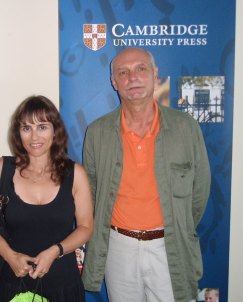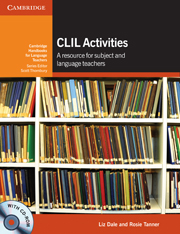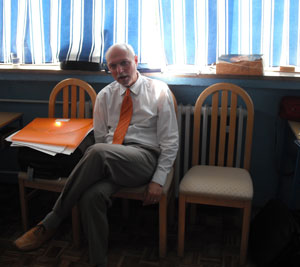Well, I got back from summer holidays and immediately jumped back in the saddle…er, seat belt again with three trips before the start of the 2011/12 school year: to Serbia for a weekend with Cambridge residential summer school in Kovacica outside Belgrade; for a four-city tour around Bosnia–Herzegovina; and for the Fischer International conference in Bucharest. I was giving lots of different talks, including a new talk on Content and Language Integrated Learning (CLIL)which is the subject of this post.
The title of my talk—CLIL Won’t Kill —alludes of course to the Quentin Tarantino films Kill Bill Parts 1 and II. Now, although Tarantino is my son’s favourite film director, I personally am not a big fan of his: a wonderful stylist, yes, but I don’t find a lot of feeling or emotion (except violence) in his movies.
Anyway, I changed the sword to a nice bouquet of flowers that language teachers can offer to both subject teacher colleagues and to their own language students when involved in what I call either ‘real’ CLIL, i.e. teaching a subject and a foreign language together (as is happening in a lot of countries), or CLIL ‘lite’ which for me means the language teacher bringing topics and activities from other subjects in the school curriculum, e.g. geography, maths, science, history et al, into the language classroom.
Since my audiences were language teachers, we first looked at how language teachers can help their colleagues teaching a subject in a foreign language to, if you will, ‘ride a bicycle built for two’ (That very nice analogy for ‘real’ CLIL comes from a teacher in Novi Said, Serbia, who agreed to let me use it.): choosing and adapting materials, helping with assessment and techniques such as eliciting vocabulary and scaffolding language. We looked at practical examples from the forthcoming (in spring 2012) CLIL Activities in the Cambridge Handbooks for Language Teachers series.
For CLIL ‘lite’…Well, you know that all of your students are not going to be future English teachers (although let’s hope some of them will!) and may not be interested in languages. But they might be interested in math or geography etc. As an English teacher you of course are not supposed to know a lot about those other subjects. But if you bring into the language lessons some matter and materials from other subjects in the school curriculum, then those non- verbal/linguistic learners can sit up and shine—even in English class.
Good for individual motivation and also for class dynamics seems to me. We looked at examples of how this is achieved in Kid’s Box for Young Learners, More! for tween-agers and English in Mind for teenagers as well as supplementary activities from various Cambridge Copy Collection titles and, of course, extensive reading opportunities in both Cambridge Fact Books for Young Learners and ‘Fact Books’ strand of the Cambridge Discovery Readers series for tween- and teen- agers. Plus secondary school students, who are already thinking about their future university studies and professions, can well profit from a dictionary such as the Cambridge School Dictionary that offers them curriculum words in other subjects for, say, report writing and presentations or just for simple information and interest.
CLIL won’t kill—au contraire! Don’t you agree?
Gary Anderson, Cambridge ELT International Teacher Trainer
PS CLIL: Content and Language Integrated Learning by Do Coyle, Philip Hood and David Marsh gives a comprehensive look at the subject. And you’ll find some interesting ideas in The TKT Course: CLIL Module by Kat Bentley—even in you’re not taking the Cambridge ESOL Teaching Knowledge Test.





 Posted by internationalteachertrainer
Posted by internationalteachertrainer 